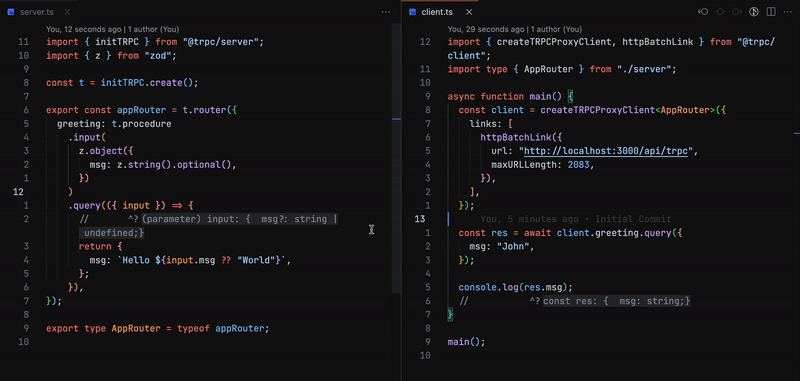Type Safety
- @trpc/server:
@trpc/server provides strong type safety by allowing developers to define their API schema using TypeScript types. This ensures that both the client and server have a shared understanding of the data structures, reducing the likelihood of runtime errors and improving code reliability.
- next-connect:
next-connect does not inherently provide type safety as it is primarily a middleware framework. However, it can be used in conjunction with TypeScript to create type-safe middleware functions, but it requires additional setup to achieve the same level of type safety as @trpc/server.
Middleware Support
- @trpc/server:
@trpc/server has built-in support for middleware, allowing developers to easily add functionality such as authentication, logging, and error handling to their API routes. This makes it straightforward to manage cross-cutting concerns in a structured manner.
- next-connect:
next-connect excels in middleware support, enabling developers to compose multiple middleware functions in a clean and readable way. This allows for greater flexibility in handling requests and responses, making it easy to implement custom logic and error handling.
Ease of Use
- @trpc/server:
@trpc/server is designed for TypeScript developers, providing a seamless experience when building APIs. Its intuitive API and type inference features make it easy to use, especially for those already familiar with TypeScript and React.
- next-connect:
next-connect offers a simple and straightforward API for creating API routes in Next.js. Its middleware-centric approach allows developers to quickly set up and manage routes without the need for extensive boilerplate code, making it user-friendly for both beginners and experienced developers.
Integration with Next.js
- @trpc/server:
@trpc/server integrates well with Next.js, providing a type-safe way to build APIs that can be consumed by Next.js applications. This integration allows for efficient data fetching and state management, enhancing the overall development experience.
- next-connect:
next-connect is specifically designed for Next.js applications, making it an ideal choice for developers looking to create API routes within the Next.js framework. Its compatibility with Next.js routing and middleware system simplifies the process of building server-side functionality.
Community and Ecosystem
- @trpc/server:
@trpc/server has a growing community and ecosystem, with increasing adoption among TypeScript developers. Its focus on type safety and developer experience makes it a popular choice for modern web applications.
- next-connect:
next-connect benefits from the larger Next.js community, providing access to a wealth of resources, plugins, and middleware options. This ecosystem support can be advantageous for developers looking to extend functionality or find solutions to common challenges.







